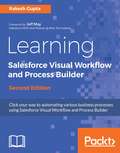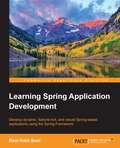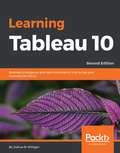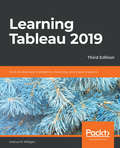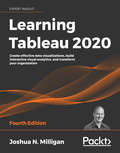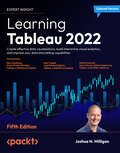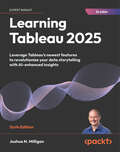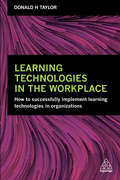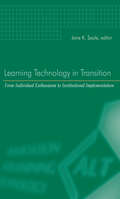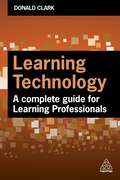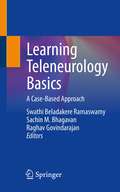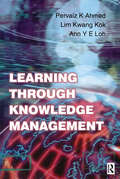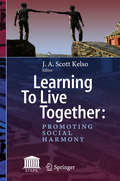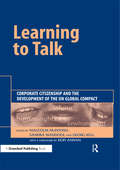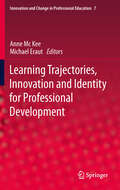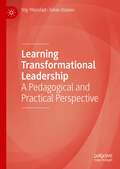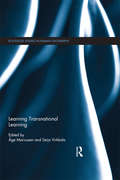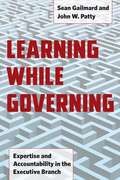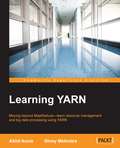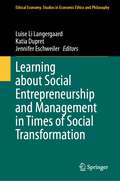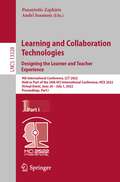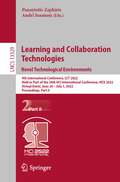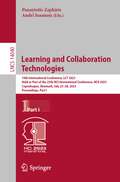- Table View
- List View
Learning Salesforce Visual Workflow and Process Builder - Second Edition
by Rakesh GuptaClick your way to automating various business processes using Salesforce Visual Workflow About This Book • Develop an application using Point and Click with the help of Flow • Get to grips with various ways to launch a Flow • Capture data from an external user without using the Visualforce page • Save user input into the database, and learn how to query and manipulate the data • Discover various ways to debug and deploy Flow and Process Builder • Understand the concepts of Subflow and Login Flow • Handle complex business processes using Process builder and keep them clean • Use existing or new Flows to work with Salesforce Lightning Experience. Who This Book Is For This book is intended for those who want to use Flows to automate their business requirements by clicking, not coding. No previous experience in computer coding or programming is required. What You Will Learn • Develop an application using point and click with the help of Flow • Get to grips with various ways to launch a Flow • Capture data from an external user without using the Visualforce page • Save user input into the database, and learn how to query and manipulate the data • Discover various ways to debug and deploy Flow and Process Builder • Understand the concepts of Subflow and Login Flow • Handle complex business processes using Process builder and keep them clean • Use existing or new Flows to work with Salesforce Lightning Experience. In Detail Salesforce Management System is an information system used in CRM to automate the business processes like sales and marketing. To implement this, Force.com developed a powerful tool called Visual Workflow to automate business processes by creating applications also called Flows. Learning Salesforce Visual Workflow, Second Edition is a practical guide on Flows that will enable you to develop custom applications in Salesforce with minimized code usage. The book starts with an introduction to Visual Workflows that teaches all the building blocks of creating Flows and use it efficiently. You will learn how to easily automate business processes and tackle complex business scenarios using Flows. The book explains the working of the Process Builder so you can create reusable processes. The book also covers how you can integrate existing or newly created Flows with the Salesforce Lightening Experience. By the end of the book, you will get a clear understanding on how to use Flows and Process Builder in your organization to optimize code usage. Style and approach Step by step approch to use Process Builder to solve complex business requirements with the help of Flow
Learning Spring Application Development
by Ravi Kant SoniThis book is intended for those who are interested in learning the core features of the Spring Framework. Prior knowledge of Java programming and web development concepts with basic XML knowledge is expected.
Learning Strategies for Sustainable Organisations (Routledge Studies in Sustainable Development)
by Bryan HopkinsLearning Strategies for Sustainable Organisations explores sustainability in the context of organisational practice and its implications for learning. Based on a systems thinking approach, it provides a thorough grounding in the principles of systems thinking and tools that can be used to help implement sustainability-focused learning strategies. Increasingly, organisations are recognising the importance of adapting their practices to become more sustainable. Drawing on the Agenda 2030 Sustainable Development Goals as a framework, new knowledge, skills and attitudes are required to help provide products and services that align with changing social and ecological environments and better serve the communities of which they are a part. This book is a practical guide showing how to facilitate sustainability learning and development within organisations, explaining how to identify gaps in current practice, take into account different contexts and perspectives about what sustainability means, and evaluate results following implementation. Learning resources include chapter summaries, illustrations, reflection points, mind maps and further reading. Written by an independent performance and learning consultant with extensive experience working with international organisations, this book provides a necessary toolkit for human resource development directors, training managers, chief sustainability officers and management consultants specialising in sustainable development.
Learning Tableau 10 - Second Edition
by Joshua N. MilliganLearn how to create effective data visualizations with Tableau and unlock a smarter approach to business analytics. It might just transform your organization About This Book * Create stylish visualizations and dashboards that explain complexity with clarity * Learn effective data storytelling to transform how your business uses ideas and makes decisions * Explore all the new features in Tableau 10 and start to redefine what business analytics means to your organization Who This Book Is For Got data? Not sure what to make of it? This is the guide for you - whether you've been working with Tableau for years or are just beginning your adventure into business analytics. What You Will Learn * Find out how to build effective visualizations and dashboards * Prepare and clean your data so you can be sure Tableau is finding answers to your questions - not raising more problems * Discover how to create advanced visualizations that explain complexity with clarity and style * Dig deeper into your data with clustering and distribution models that allow you to analyze trends and make forecasts * Learn how to use data storytelling to aid decision-making and strategy * Share dashboards and visualizations to cultivate a culture where data is available and valued In Detail Tableau has for some time been one of the most popular Business Intelligence and data visualization tools available. Why? Because, quite simply, it's a tool that's responsive to the needs of modern businesses. But it's most effective when you know how to get what you want from it - it might make your business intelligent, but it isn't going to make you intelligent... We'll make sure you're well prepared to take full advantage of Tableau 10's new features. Whether you're an experienced data analyst that wants to explore 2016's new Tableau, or you're a beginner that wants to expand their skillset and bring a more professional and sharper approach to their organization, we've got you covered. Beginning with the fundamentals, such as data preparation, you'll soon learn how to build and customize your own data visualizations and dashboards, essential for high-level visibility and effective data storytelling. You'll also find out how to so trend analysis and forecasting using clustering and distribution models to inform your analytics. But it's not just about you - when it comes to data it's all about availability and access. That's why we'll show you how to share your Tableau visualizations. It's only once insights are shared and communicated that you - and your organization - will start making smarter and informed decisions. And really, that's exactly what this guide is for. Style and approach Practical yet comprehensive, this Tableau guide takes you from the fundamentals of the tool before diving deeper into creating advanced visualizations. Covering the latest features found in Tableau 10, this might be the guide that transforms your organization.
Learning Tableau 2019: Tools for Business Intelligence, data prep, and visual analytics, 3rd Edition
by Joshua N. MilliganCreate powerful data visualizations and unlock intelligent business insights with Tableau Key Features Explore all the latest Tableau 2019 features and redefine business analytics for your organization Create impressive data visualizations and interactive dashboards to get insights from your data Learn effective data storytelling to transform how your business leverages data and makes decisions Book Description Tableau is the gold standard of business intelligence and visual analytics tools in every industry. It enables rapid data visualization and interpretation with charts, graphs, dashboards, and much more. Updated with the latest features of Tableau, this book takes you from the foundations of the Tableau 2019 paradigm through to advanced topics. This third edition of the bestselling guide by Tableau Zen Master, Joshua Milligan, will help you come to grips with updated features, such as set actions and transparent views. Beginning with installation, you'll create your first visualizations with Tableau and then explore practical examples and advanced techniques. You'll create bar charts, tree maps, scatterplots, time series, and a variety of other visualizations. Next, you'll discover techniques to overcome challenges presented by data structure and quality and engage in effective data storytelling and decision making with business critical information. Finally, you'll be introduced to Tableau Prep, and learn how to use it to integrate and shape data for analysis. By the end of this book, you will be equipped to leverage the powerful features of Tableau 2019 for decision making. What you will learn Develop stunning visualizations that explain complexity with clarity Explore the exciting new features of Tableau Desktop and Tableau Prep Connect to various data sources to bring all your data together Uncover techniques to prep and structure your data for easy analysis Create and use calculations to solve problems and enrich analytics Master advanced topics such as sets, LOD calcs, and much more Enable smart decisions with clustering, distribution, and forecasting Share your data stories to build a culture of trust and action Who this book is for This Tableau book is for anyone who wants to understand data. If you're new to Tableau, don't worry. This book builds on the foundations to help you understand how Tableau really works and then builds on that knowledge with practical examples before moving on to advanced techniques. Working experience with databases will be useful but is not necessary to get the most out of this book.
Learning Tableau 2020: Create effective data visualizations, build interactive visual analytics, and transform your organization, 4th Edition
by Joshua N. MilliganGain a solid foundation to learn Tableau, and develop the skills and abilities required for an advanced mastery of the tool. Whether you're new to Tableau or have been using it years, you will benefit from this book. Key Features Explore the latest Tableau 2020 features and redefine business analytics for your firm Understand visualizing data and creating interactive dashboards to gain meaningful insights Learn implementing effective data storytelling to redefine how your business leverages data and makes decisions Book Description Learning Tableau strengthens your command on Tableau fundamentals and builds on advanced topics. The book starts by taking you through foundational principles of Tableau. We then demonstrate various types of connections and how to work with metadata. We teach you to use a wide variety of visualizations to analyze and communicate the data, and introduce you to calculations and parameters. We then take an in-depth look at level of detail (LOD) expressions and use them to solve complex data challenges. Up next, we show table calculations, how to extend and alter default visualizations, build an interactive dashboard, and master the art of telling stories with data. This Tableau book will introduce you to visual statistical analytics capabilities, create different types of visualizations and dynamic dashboards for rich user experiences. We then move on to maps and geospatial visualization, and the new Data Model capabilities introduced in Tableau 2020.2. You will further use Tableau Prep's ability to clean and structure data and share the stories contained in your data. By the end of this book, you will be proficient in implementing the powerful features of Tableau 2020 for decision-making. What you will learn Develop stunning visualizations to explain complex data with clarity Explore exciting new Data Model capabilities Connect to various data sources to bring all your data together Leverage Tableau Prep Builder's amazing capabilities for data cleaning and structuring Create and use calculations to solve problems and enrich the analytics Master advanced topics such as sets, LOD calculations, and much more Enable smart decisions with data clustering, distribution, and forecasting Share your data stories to build a culture of trust and action Who this book is for This Tableau book is for anyone who wants to understand data. If you're new to Tableau, don't worry. This book will simplify Tableau for beginners to build on the foundations to help you understand how Tableau really works and then builds on that knowledge with practical examples before moving on to advanced techniques. Having a bit of background with data will help, but you don't need to know scripting, SQL or database structures.
Learning Tableau 2022: Create effective data visualizations, build interactive visual analytics, and improve your data storytelling capabilities, 5th Edition
by Joshua N. Milligan Mark Tossell Blair Hutchinson Roberto AndreoliNow in color, this edition of Learning Tableau will empower you to bring data to life and make better business decisionsKey FeaturesLearn the basics of data analysis, from snappy visualizations to comprehensive dashboardsGain meaningful insights with geospatial analysis, scripting extensions, and other advanced methodsExplore the latest Tableau 2022 features, including Einstein Discovery and Explain DataBook DescriptionLearning Tableau 2022 helps you get started with Tableau and data visualization, but it does more than just cover the basic principles. It helps you understand how to analyze and communicate data visually, and articulate data stories using advanced features.This new edition is updated with Tableau's latest features, such as dashboard extensions, Explain Data, and integration with CRM Analytics (Einstein Analytics), which will help you harness the full potential of artificial intelligence (AI) and predictive modeling in Tableau.After an exploration of the core principles, this book will teach you how to use table and level of detail calculations to extend and alter default visualizations, build interactive dashboards, and master the art of telling stories with data.You'll learn about visual statistical analytics and create different types of static and animated visualizations and dashboards for rich user experiences. We then move on to interlinking different data sources with Tableau's Data Model capabilities, along with maps and geospatial visualization. You will further use Tableau Prep Builder's ability to efficiently clean and structure data.By the end of this book, you will be proficient in implementing the powerful features of Tableau 2022 to improve the business intelligence insights you can extract from your data.What you will learnDevelop stunning visualizations to explain complex data with clarityBuild interactive dashboards to drive actionable user insightsExplore Data Model capabilities and interlink data from various sourcesCreate and use calculations to solve problems and enrich your analyticsEnable smart decision-making with data clustering, distribution, and forecastingExtend Tableau's native functionality with extensions, scripts, and AI through CRM Analytics (formerly Einstein Analytics)Leverage Tableau Prep Builder's amazing capabilities for data cleaning and structuringShare your data stories to build a culture of trust and actionWho this book is forThis Tableau book is for aspiring BI developers and data analysts, data scientists, researchers, and anyone else who wants to gain a deeper understanding of data through Tableau. This book starts from the ground up, so you won't need any prior experience with Tableau before you dive in, but a full Tableau license (or 14-day demo license) is essential to be able to make use of all the exercises.
Learning Tableau 2024: Master Tableau's newest features to revolutionize your data storytelling with AI-enhanced insights
by Joshua N. MilliganExplore the full potential of Tableau and learn how to draw valuable insights from data directly from a Tableau Visionary (Zen Master). Purchase of the print or Kindle book includes a free PDF ebook.Key FeaturesExplore the new Tableau AI features including Tableau Pulse, Tableau Agent, and other AI enhancements enabling machine learning, GPT, and NLPTransform complex datasets into interactive insights using new features of the Tableau data model and Tableau PrepGain deeper insights with geospatial analysis, scripting extensions, and other advanced methodsBook Description"Learning Tableau 2024" marks a new era in data visualization and analysis, bringing together advanced AI integrations and dynamic user experiences. This sixth edition, authored by Tableau Visionary (Zen Master) Joshua Miligan, is your comprehensive guide to mastering the latest innovations in Tableau that transform raw data into actionable insights. This edition introduces groundbreaking features like Tableau AI (including Tableau Pulse and Tableau Agent), enhancing your analytical capabilities with AI-driven data exploration and automated insights. With detailed walkthroughs, you’ll learn to build dynamic dashboards that respond to your data in real time and delve into sophisticated AI functionalities that predict trends and model scenarios. Whether you're a seasoned data professional or new to Tableau, this book provides the tools you need to leverage Tableau’s full potential. From integrating diverse data sources using the enhanced Data Model to employing advanced geospatial functions for detailed mapping, every chapter is packed with expert knowledge and practical applications designed to put powerful analytics at your fingertips.What you will learnImplement advanced AI features to streamline data analysisBuild and customize dynamic dashboards for interactive data storytellingLeverage new geospatial functions for comprehensive mappingEnhance data prep with Tableau Prep's new featuresIntegrate and analyze data from multiple sources effectivelyWho this book is forThis Tableau book is for aspiring BI developers and data analysts, data scientists, researchers, and anyone else who wants to gain a deeper understanding of data through Tableau. This book starts from the ground up, so you won't need any prior experience with Tableau before you dive in, but a full Tableau license (or 14-day demo license) is essential to be able to make use of all the exercises.
Learning Technologies in the Workplace: How to Successfully Implement Learning Technologies in Organizations
by Donald H TaylorKnowledge was once power - difficult to find, slow to transmit and coveted. Now we can access almost the sum total of human information with a swipe of our thumbs. The impact on the knowledge economy has been vast, leaving learning and development (L&D) professionals wondering how to keep pace. Many organizations naturally turn to technology to ensure workplace learning at scale and at speed, but stumble when it comes to successfully deploying and using it. Learning Technologies in the Workplace examines 16 years of learning technology implementations to find the secrets behind the most successful.Examples in the book from the Hershey Company and BP, airlines, tech companies and manufacturers point to four common factors. Successful learning technology teams all have APPA: a clear aim, a people focus, a wide perspective and a pragmatic, can-do attitude. Learning Technologies in the Workplace gives readers practical pointers for each of these four points, helping them implement and use learning technologies well, with particular emphasis on the essential skill of identifying stakeholders and winning their support.
Learning Technology in Transition: from Individual Enthusiasm to Institutional Implementation
by Jane K. SealeIn April 2003, The Association for Learning Technology (ALT) celebrated its tenth anniversary and this book has been produced in order to commemorate this landmark achievement. It represents a collaboration between key members of ALT and members of ALTs' sister organisations: SURF in Holland and ASCILITE in Australia.The aims of the book are to use
Learning Technology: A Complete Guide for Learning Professionals
by Donald ClarkLearning technology is now an integral part of all learning and development (L&D) activity. Understanding what these technologies are, how they work and their aims is key to successful L&D practice. Learning Technology is written by a leading voice in the learning tech industry with over 35 years' experience. It explains the history of learning tech, its aims, its introduction to the workplace and the benefits to both the individual and the business. This book covers everything from online and mobile learning, simulations and gamification as well as detailed discussion of Learning Management Systems (LMSs), Learning Experience Platforms (LXPs) and Learning Record Stores (LRSs). This book also highlights the importance of data and analytics and covers the latest developments in the learning technology space including artificial intelligence, virtual reality and the metaverse. Most importantly, Learning Technology helps L&D professionals assess where their budget is best spent on technology and explains how to analyse the return on investment (ROI). Full of examples and practical advice throughout, this book also includes case studies from organizations including British Airways, UK National Health Service (NHS) and Learning Pool.
Learning Teleneurology Basics: A Case-Based Approach
by Raghav Govindarajan Sachin M. Bhagavan Swathi Beladakere RamaswamyThis book focuses on the basics of teleneurology and provides an outline of curriculum and practice with the help of clinical vignettes. It fills the gap for a text that reflects the rapidly evolving nature of the teleneurology field, with specific attention paid to examining how this can be extended to patient treatment. Recent COVID-19 pandemic rapidly revolutionized telemedicine technology and reformed the practice of medicine; this book will serve as an easy guide to physicians all over the world to adapt to changing needs of the health care system. Concise and comprehensive, this 12 chapter book covers a variety of neurological disorders and highlights specific aspects of teleneurology practice, including medicolegal issues, licensure, standard of care, ethical issues, and future trends. Designed to be a resource for students and residents, as well as medical school faculty and practicing clinicians, Learning Teleneurology Basics will prepare the reader to deliver care remotely.
Learning Through Knowledge Management
by Pervaiz K. Ahmed Kwang Kok Lim Ann Y Loh'Learning through Knowledge Management' provides an insightful overview of the main issues integrating learning and Knowledge Management. It offers a rich resource of case examples that highlight Knowledge Management in practice. The text explores and defines learning and Knowledge Management concepts, and deals with the elements that play an important part in determining implementation success in the organization. The chapters present a managerially oriented discussion of the following key areas:* The role of processes in managing knowledge* The behavioural side of Knowledge Management * Leadership reflexes for knowledge management success* The key features of Information Technology required for Knowledge Management* The future of Knowledge Management as part of organization management.There are many case studies which include: British Airways BP Amoco Ford Hewlett Packard Xerox Swedish Police IBM The case studies encompass a diverse and broad range of sectors, maturity of practice, problems and approaches to Knowledge Management.
Learning To Hear God's Voice: A Life-Altering Discovery
by Bill McIntyreHave you ever heard someone say, “God lead me to do _____” or “God said _____ to me?” Did you wonder, “Is he some kind of spiritual giant or is his bubble just a little off center?” Author Bill McIntyre shares true stories of his personal journey, from a childhood plan for murder, to hiking through jungles sharing the Gospel in remote African villages. Bill relays testimonies and examples of God’s miraculous workings in his life to demonstrate how to hear and understand the voice of the Holy Spirit. In these pages you will discover sound Scriptural teachings on hearing the voice of God. This is not a book that says, “Try harder to become more sinless. Follow all the church’s religious rules.” It doesn’t say, “If you were just a better person God might talk to you, too.” Finally, here is a book of practical advice on how to train your spirit to hear God and how to recognize His voice when He speaks. God desires to talk to you. Are you ready to learn how to listen? “Bill’s life stories are for people like me who benefit from knowing others have faced difficulties and circumstances never taught in school and far from theoretical. You will learn much from reading Bill’s experiences and from his practical application of God’s Word. This is a book unlike any other you have ever read.” Ric Shields President/Founder of DoorWays®
Learning To Live Together: Promoting Social Harmony
by J. A. Scott KelsoThis book is devoted to the issue of how we can learn to live together in the face of division and conflict. It is dedicated to the life and work of a remarkable human being, Dr Epimenidis Haidemenakis, scientist, statesman, visionary leader, President Emeritus of the International S.T.E.P.S. Foundation and founding father of The Olympiads of the Mind (OM). The monograph consists of a collection of papers presented at the 8th and 9th Olympiads of the Mind held in Washington, DC and Chania, Crete respectively. Distinguished international scholars, government and corporate representatives, leading researchers and academics from multiple disciplines and Nobel Laureates Leon Lederman (Physics, 1988), Martin Perl (Physics, 1995) and Yuan T. Lee (Chemistry, 1986) address a broad range of issues all with the aim of improving the human condition and achieving cooperation among the people of the world. The topics include the environment, sustainability and security; diversity and how to achieve integration and peace among people in a fractured world; the important role of brain research; how to overcome poverty and inequality; how to enhance creativity and improve education at all levels; and how new technologies and tools can be used for common benefit. The culmination of the book is a call to action, to join what one might call the “OM Movement”—bringing the best minds in the world together to create solutions to world issues so that we can all live together in harmony.
Learning To Talk: Corporate Citizenship and the Development of the UN Global Compact
by Sandra Waddock Georg Kell Malcolm McintoshThe UN Global Compact complements other corporate citizenship initiatives by promoting dialogue on the relationship between business and society. At the same time it is the only truly global corporate citizenship initiative. It is not an auditable standard; indeed, it is not a standard or a code in the way that these are normally viewed. It is a set of principles through which business and the United Nations can work in partnership for global social development. For some businesses it is a simplified codification of their existing policies and management practices, but for many engagement represents a challenge and an opportunity to raise their game by aligning profitability with the common good. As the only genuinely global corporate citizenship initiative, the Global Compact draws its moral authority from the UN Secretary-General and its moral and political legitimacy from the UN as the only global political body. It can be viewed as a series of nested networks involving the Secretary-General's Office, the ILO, UNEP, UNHCHR, UNDP and UNIDO, business, NGOs and labour. It can variously be described as an international learning network, as a social network of people and organizations engaged in a global conversation, as a global public policy network, and as a multi-stakeholder dialogue. It is all of these things, but more than anything its greatest success has been in providing a convening platform for a growing global conversation about social development among a variety of actors. However the Global Compact is viewed, it is time to reflect on the first tentative steps of an initiative born in the aftermath of the Cold War, in the "triumph of global economic liberalism" and mass demonstrations against "globalisation". In its first few years, the world has experienced 9/11 and the Iraq War, not forgetting the forty or so civil wars that are ongoing at this time. Whatever is written about the UN Global Compact or its success will be tentative. But there can be some serious reflection on its aims and origins; some telling of stories of engagement; and discussion on how this initiative has quickly become an important reference point in the dialogue on global and corporate governance.
Learning Trajectories, Innovation and Identity for Professional Development
by Anne Mc Kee Michael ErautEducators in the professions have always had unique demands placed upon them. These include the need to keep pace with rapidly evolving knowledge bases, developing skills and attitudes appropriate to practice, learning in the workplace and fostering public confidence. For twenty years, these new demands have created additional educational imperatives. Public accountability has become more intensive and extensive. Practitioners practice in climates more subject to scrutiny and less forgiving of error. The contexts in which professionals practice and learn have changed and these changes involve global issues and problems. Often, professionals are the first responders who are required to take an active stance in defining and solving problems. This book explores the pedagogic implications of these challenges internationally for a wide range of professions which include: accountants, military company commanders, surgeons, nurse practitioners, academic, managers, community physicians and dentists. The established view of professional development is about what the professional knows and can do. The authors broaden this view to include the systemic and contextual factors that affect learning, and the conditions necessary for effective practice and identity development across the professional lifespan. Authors examine the unique particularities and requirements of diverse professional groups. The editors emphasize new ideas and learning that emerges across the professions. As readers use this book as a pathway to their own innovations in scholarship and pedagogic research, they join their colleagues in supportingnew directions in learning, teaching and assessment across professions.
Learning Transformational Leadership: A Pedagogical and Practical Perspective
by Johan Olaisen Stig YtterstadBased on empirical research, theoretical frameworks and practice examples, this book presents a deep dive into the topic of transformational leadership. In particular, it investigates whether participants in transformational leader courses will practice more potent transformation leader qualities after completion of the courses than before. It examines which elements of leadership development can describe what happens in this intervention, as well as whether there is any covariation between transformation leadership and Sternberg's learning style, and the role that a coach plays in the development of transformational leadership. An engaging and valuable resource for students, scholars, and practitioners, the book includes pluralistic frameworks, conceptual tools, and lessons for further work. It covers exciting issues for the technical, social, and managerial professions involved in collaborative creative work across disciplines.
Learning Transnational Learning (Routledge Studies in Human Geography)
by Åge Mariussen Seija VirkkalaSystems of innovation that are conducted within national borders can preserve inefficient solutions and prevent development. This has led to a feeling that transnational learning strategies are more and more desirable. In practice, the field of transnational learning has been dominated by various policy-making institutions, such as the OECD and European Union, working through different types of policy instruments and programs such as structural funds, open methods of coordination, as well as international research institutions and networks set up by cooperating national governments working on comparative analysis, benchmarking and indicators. This book lays out a set of methods which can further enhance the experience of transnational learning, starting from the sociological ideas promoted by Charles Sabel of learning through monitoring, and by Marie Laure Djelic and others of the “translation” of experiences between different countries. Case studies and examples are collected from three fields: industrial development, tourism and local government.
Learning While Governing: Expertise and Accountability in the Executive Branch (Chicago Studies in American Politics)
by Sean Gailmard John W. PattyAlthough their leaders and staff are not elected, bureaucratic agencies have the power to make policy decisions that carry the full force of the law. In this groundbreaking book, Sean Gailmard and John W. Patty explore an issue central to political science and public administration: How do Congress and the president ensure that bureaucratic agencies implement their preferred policies? The assumption has long been that bureaucrats bring to their positions expertise, which must then be marshaled to serve the interests of a particular policy. In Learning While Governing, Gailmard and Patty overturn this conventional wisdom, showing instead that much of what bureaucrats need to know to perform effectively is learned on the job. Bureaucratic expertise, they argue, is a function of administrative institutions and interactions with political authorities that collectively create an incentive for bureaucrats to develop expertise. The challenge for elected officials is therefore to provide agencies with the autonomy to do so while making sure they do not stray significantly from the administration's course. To support this claim, the authors analyze several types of information-management processes. Learning While Governing speaks to an issue with direct bearing on power relations between Congress, the president, and the executive agencies, and it will be a welcome addition to the literature on bureaucratic development.
Learning YARN
by Akhil Arora Shrey MehrotraThis book is intended for those who want to understand what YARN is and how to efficiently used it for resource management of large clusters. For cluster administrators, this book gives a detailed explanation of provisioning and managing YARN clusters. If you are an or a Java developer or an open-source contributor, this book will help you to drill down the YARN architecture and application execution phases. This book would also help big data engineers explore YARN integration with real-time analytics technologies like Spark and Storm.
Learning about Social Entrepreneurship and Management in Times of Social Transformation (Ethical Economy #66)
by Luise Li Langergaard Katia Dupret Jennifer EschweilerThe book brings together perspectives on entrepreneurship research, education and practice to understand social entrepreneurship in its wider societal, political and economic context. Its unique contribution comes from its interdisciplinary approach that spans from the societal to the organizational level, with specific focus social innovation and management. It views management of social entrepreneurship and social enterprise in light of its societal context and employs social innovation to critically assess social entrepreneurship as driver of change. The emergence of social entrepreneurship as an academic field is linked to several societal trends such as public austerity, financial crises, new social challenges and a growing counter-movement to globalised capitalism. Generally seen as organisations serving both social and economic objectives, social enterprises, social innovation and social entrepreneurship have their roots in civil society, civic activism or the solidarity economy, but also manifest themselves as for-profit companies, with new organisational forms emerging and old ones changing. The contributions in this book elucidate these developments and the role of social entrepreneurs and social enterprises. Furthermore, the book offers great insight into the specific ways of managing, leading and creating innovation in social enterprises as well as perspectives on how to understand their social impact or value creation.
Learning and Collaboration Technologies. Designing the Learner and Teacher Experience: 9th International Conference, LCT 2022, Held as Part of the 24th HCI International Conference, HCII 2022, Virtual Event, June 26 – July 1, 2022, Proceedings, Part I (Lecture Notes in Computer Science #13328)
by Panayiotis Zaphiris Andri IoannouThis proceedings, LCT 2022, constitutes the refereed proceedings of the 9th International Conference on Learning and Collaboration Technologies, LCT 2022, held as Part of the 24th International Conference, HCI International 2022, which took place in June/July 2022. Due to COVID-19 pandemic the conference was held virtually.The total of 1271 papers and 275 poster papers included in the 39 HCII 2022 proceedings volumes was carefully reviewed and selected from 5487 submissions. The papers of LCT 2022 are organized in topical sections named: Designing and Developing Learning Technologies; Learning and Teaching Online; Diversity in Learning; Technology in Education: Practices and Experiences.
Learning and Collaboration Technologies. Novel Technological Environments: 9th International Conference, LCT 2022, Held as Part of the 24th HCI International Conference, HCII 2022, Virtual Event, June 26 – July 1, 2022, Proceedings, Part II (Lecture Notes in Computer Science #13329)
by Panayiotis Zaphiris Andri IoannouChapter “Developing a VR Tool to Support Repeat Pattern Design Learning ” is available open access under a Creative Commons Attribution 4.0 International License via link.springer.com.
Learning and Collaboration Technologies: 10th International Conference, LCT 2023, Held as Part of the 25th HCI International Conference, HCII 2023, Copenhagen, Denmark, July 23–28, 2023, Proceedings, Part I (Lecture Notes in Computer Science #14040)
by Panayiotis Zaphiris Andri IoannouThis two-volume set of LCT 2023, constitutes the refereed proceedings of the 10th International Conference on Learning and Collaboration Technologies, LCT 2023, held as Part of the 24th International Conference, HCI International 2023, which took place in July 2023 in Copenhagen, Denmark.The total of 1578 papers and 396 posters included in the HCII 2023 proceedings volumes was carefully reviewed and selected from 7472 submissions. The papers of LCT 2022 Part I are organized in topical sections named: Designing Learning Experiences; Understanding the Learning Experience; Technology-supported Teaching; Supporting Creativity in Learning.
